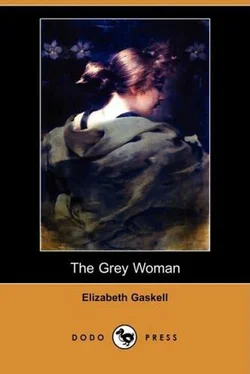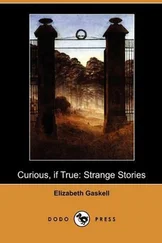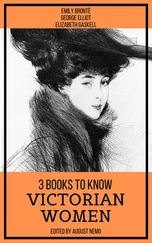As soon as we could, we struck round in the shadow, leaving the boisterous and merry fellow-passengers to their supper. We crossed the court, borrowed a lantern from the ostler, and scrambled up the rude steps to our chamber above the stable. There was no door into it; the entrance was the hole into which the ladder fitted. The window looked into the court. We were tired and soon fell asleep. I was wakened by a noise in the stable below. One instant of listening, and I wakened Amante, placing my hand on her mouth, to prevent any exclamation in her half-roused state. We heard my husband speaking about his horse to the ostler. It was his voice. I am sure of it. Amante said so too. We durst not move to rise and satisfy ourselves. For five minutes or so he went on giving directions. Then he left the stable, and, softly stealing to our window, we saw him cross the court and re-enter the inn. We consulted as to what we should do. We feared to excite remark or suspicion by descending and leaving our chamber, or else immediate escape was our strongest idea. Then the ostler left the stable, locking the door on the outside.
"We must try and drop through the window—if, indeed, it is well to go at all," said Amante.
With reflection came wisdom. We should excite suspicion by leaving without paying our bill. We were on foot, and might easily be pursued. So we sat on our bed's edge, talking and shivering, while from across the court the laughter rang merrily, and the company slowly dispersed one by one, their lights flitting past the windows as they went upstairs and settled each one to his rest.
We crept into our bed, holding each other tight, and listening to every sound, as if we thought we were tracked, and might meet our death at any moment. In the dead of night, just at the profound stillness preceding the turn into another day, we heard a soft, cautious step crossing the yard. The key into the stable was turned—some one came into the stable—we felt rather than heard him there. A horse started a little, and made a restless movement with his feet, then whinnied recognition. He who had entered made two or three low sounds to the animal, and then led him into the court. Amante sprang to the window with the noiseless activity of a cat. She looked out, but dared not speak a word. We heard the great door into the street open—a pause for mounting, and the horse's footsteps were lost in distance.
Then Amante came back to me. "It was he! he is gone!" said she, and once more we lay down, trembling and shaking.
This time we fell sound asleep. We slept long and late. We were wakened by many hurrying feet, and many confused voices; all the world seemed awake and astir. We rose and dressed ourselves, and coming down we looked around among the crowd collected in the court-yard, in order to assure ourselves he was not there before we left the shelter of the stable.
The instant we were seen, two or three people rushed to us.
"Have you heard? — Do you know? — That poor young lady—oh, come and see!" and so we were hurried, almost in spite of ourselves, across the court, and up the great open stairs of the main building of the inn, into a bed-chamber, where lay the beautiful young German lady, so full of graceful pride the night before, now white and still in death. By her stood the French maid, crying and gesticulating.
"Oh, madame! if you had but suffered me to stay with you! Oh! the baron, what will he say?" and so she went on. Her state had but just been discovered; it had been supposed that she was fatigued, and was sleeping late, until a few minutes before. The surgeon of the town had been sent for, and the landlord of the inn was trying vainly to enforce order until he came, and, from time to time, drinking little cups of brandy, and offering them to the guests, who were all assembled there, pretty much as the servants were doing in the court-yard.
At last the surgeon came. All fell back, and hung on the words that were to fall from his lips.
"See!" said the landlord. "This lady came last night by the diligence with her maid. Doubtless a great lady, for she must have a private sitting-room—"
"She was Madame the Baroness de Rœder," said the French maid.
— "And was difficult to please in the matter of supper, and a sleeping-room. She went to bed well, though fatigued. Her maid left her—"
"I begged to be allowed to sleep in her room, as we were in a strange inn, of the character of which we knew nothing; but she would not let me, my mistress was such a great lady."
— "And slept with my servants," continued the landlord. "This morning we thought madame was still slumbering; but when eight, nine, ten, and near eleven o'clock came, I bade her maid use my pass-key, and enter her room—"
"The door was not locked, only closed. And here she was found—dead is she not, monsieur? — with her face down on her pillow, and her beautiful hair all scattered wild; she never would let me tie it up, saying it made her head ache. Such hair!" said the waiting-maid, lifting up a long golden tress, and letting it fall again.
I remembered Amante's words the night before, and crept close up to her.
Meanwhile, the doctor was examining the body underneath the bed-clothes, which the landlord, until now, had not allowed to be disarranged. The surgeon drew out his hand, all bathed and stained with blood; and holding up a short, sharp knife, with a piece of paper fastened round it.
"Here has been foul play," he said. "The deceased lady has been murdered. This dagger was aimed straight at her heart." Then, putting on his spectacles, he read the writing on the bloody paper, dimmed and horribly obscured as it was —
Numéro Un.
Ainsi les Chauffeurs se vengent.
"Let us go!" said I to Amante. "Oh, let us leave this horrible place!"
"Wait a little," said she. "Only a few minutes more. It will be better."
Immediately the voices of all proclaimed their suspicions of the cavalier who had arrived last the night before. He had, they said, made so many inquiries about the young lady, whose supercilious conduct all in the salle-à-manger had been discussing on his entrance. They were talking about her as we left the room; he must have come in directly afterwards, and not until he had learnt all about her, had he spoken of the business which necessitated his departure at dawn of day, and made his arrangements with both landlord and ostler for the possession of the keys of the stable and porte-cochère . In short, there was no doubt as to the murderer, even before the arrival of the legal functionary who had been sent for by the surgeon; but the word on the paper chilled every one with terror. Les Chauffeurs, who were they? No one knew, some of the gang might even then be in the room overhearing, and noting down fresh objects for vengeance. In Germany, I had heard little of this terrible gang, and I had paid no greater heed to the stories related once or twice about them in Carlsruhe than one does to tales about ogres. But here in their very haunts, I learnt the full amount of the terror they inspired. No one would be legally responsible for any evidence criminating the murderer. The public prosecutor shrank from the duties of his office. What do I say? Neither Amante nor I, knowing far more of the actual guilt of the man who had killed that poor sleeping young lady, durst breathe a word. We appeared to be wholly ignorant of everything: we, who might have told so much. But how could we? we were broken down with terrific anxiety and fatigue, with the knowledge that we, above all, were doomed victims; and that the blood, heavily dripping from the bed-clothes on to the floor, was dripping thus out of the poor dead body, because, when living, she had been mistaken for me.
At length Amante went up to the landlord, and asked permission to leave his inn, doing all openly and humbly, so as to excite neither ill-will nor suspicion. Indeed, suspicion was otherwise directed, and he willingly gave us leave to depart. A few days afterwards we were across the Rhine, in Germany, making our way towards Frankfort, but still keeping our disguises, and Amante still working at her trade.
Читать дальше












